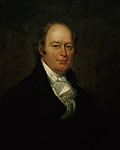| Supreme Court of the United States | |
|---|---|
 | |
 Interactive map of Supreme Court of the United States | |
| 38°53′26″N77°00′16″W / 38.89056°N 77.00444°W | |
| Established | March 4, 1789 |
| Location | Washington, D.C. |
| Coordinates | 38°53′26″N77°00′16″W / 38.89056°N 77.00444°W |
| Composition method | Presidential nomination with Senate confirmation |
| Authorised by | Constitution of the United States, Art. III, § 1 |
| Judge term length | life tenure, subject to impeachment and removal |
| Number of positions | 9 (by statute) |
| Website | supremecourt |
| This article is part of a series on the |
| Supreme Court of the United States |
|---|
 |
| The Court |
| Current membership |
|
| Lists of justices |
|
| Court functionaries |
This is a list of cases reported in volume 30 (5 Pet.) of United States Reports , decided by the Supreme Court of the United States in 1831. [1]








